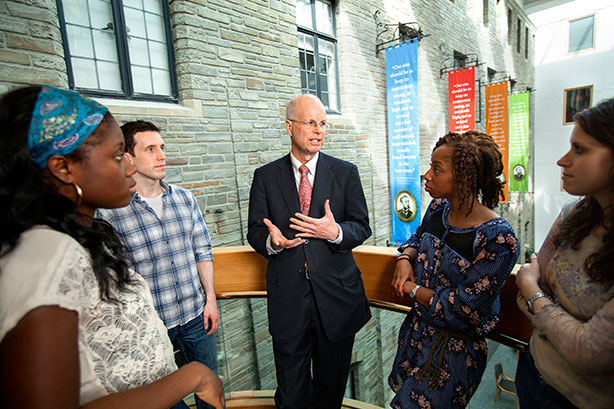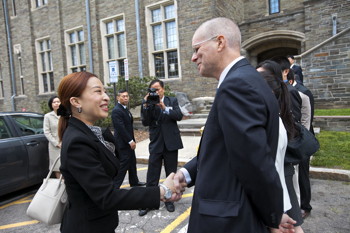DEANS Q&A
Stewart Schwab

Dean Stewart Schwab, center, chats with, from left, Malissa Osei J.D. '14, Conor McCormick J.D. '14, Danielle Jones J.D. '14 and Jocelyn Krieger J.D. '13 in the Law School's Berger Atrium.
What is something people don't realize about Cornell Law School?
How much we engage with the rest of the university. We recognize that for the students who are graduating in 2013, as quickly as five or 10 years out, many current statutes will be old and new statutes will be in, so our curriculum is not memorizing – it's understanding the forces and the policies. For that reason, we try to interact with a lot of the rest of the university: law and economics, law and philosophy, law and literature, law and anthropology. We're also engaged in efforts with Cornell Tech and the Johnson school regarding entrepreneurship, venture capital and intellectual property.
Isn't law school known for being a professional school that is hard, but doesn't necessarily prepare you, right away, to do the job?
Being a lawyer is a lifelong learning experience. There are a lot of directions and careers that lawyers can take, so certainly experience helps. There is an expectation nowadays that law graduates need to hit the ground running. And while certainly I agree with that no one wants to hit the ground crawling, I think it can be overstated. It's related to the issue of the law moving; 20 to 30 years from now the issues and statutes will be quite different. We're making sure that our students are profession-ready, recognizing that it's a lifelong career.

Schwab greets Her Royal Highness Princess Bajrakitiyabha Mahidol of Thailand, LL.M. '02, J.S.D. '05, during her 2012 visit. See larger image
I often say that law is the most intellectual of all professions, and my friends in architecture or medicine can make their own claims, but I do think that those who are particularly good at law have a wide range of interests and don't think their learning stops when they leave here.
Tell us about yourself when you're not doing this job.
Well, my wife and I are both from North Carolina. We grew up together and were high school sweethearts. She's also a lawyer who works as Cornell associate university counsel. She was the city attorney of Ithaca before that and has been in the district attorney's office and in private practice. And the other distinctive thing about us is that we have eight kids. Five of the first six have gone to Cornell, including our high school senior who's going next year. The other graduated from Ithaca College. So we have sort of a large family.
How did you manage to juggle all that with your careers?
Well, Norma is very organized. And Ithaca is very helpful for combining family life and academic or professional careers. It's a lot easier to do here than in a big city.
How did you get interested in the law?
After college I went to the University of Michigan to get a Ph.D. in economics. … I wanted to think about justice and fairness and how they interact with economics, and so pursued a law and economics degree.
Right after law school, I went to clerk for a federal judge and then two years out I clerked for Justice Sandra Day O'Connor on the [U.S.] Supreme Court.
How does legal scholarship affect policy and people in a real way?
Some of the most interesting scholarship in all of the social sciences is being done here in the Law School. We are using a variety of perspectives from other disciplines, with one sort of normal pressure: it's got to have some sort of policy relevance. That doesn't have to mean a judge or lawyer can use it directly in a case, or that it's specifically talking about a piece of legislation in Albany or Washington, but [it must have] some sort of policy relevance which keeps us from being too esoteric.
You know, there are a lot of think tanks out there and a lot of policy think tanks with a law-policy focus similar to what law schools do, but I think the best scholarship occurs here in the law schools. Why? Because over the course of the semester, the freshness, the thought, the criticism of the students, and having to explain the issues to students, all this makes teaching and scholarship reinforce each other.
What are you most proud of?
In my time as dean, we've expanded our business law curriculum with new deals and transactional law classes and created new clinic opportunities in labor law, LGBT rights and juvenile justice.
Faculty members have created new programs and institutes at the forefront of legal thought. The Clarke Business Law Institute, Cornell e-Rulemaking Initiative, Avon Global Center for Women and Justice, and Clarke Initiative for Law and Development in the Middle East and North Africa have all launched in the last decade, and the Journal of Empirical Legal Studies has blossomed.
We have expanded our study abroad opportunities and established exchange partnerships with some two dozen universities around the world. Recent countries where we've expanded our reach include Chile, China, India, Norway and South Africa.
After many years of plannning, we are well under way on Phase 1 of a multi-phased project to renovate and expand the physical plant of the Law School. This addition is the first in 25 years and the new teaching wing will be ready for students in the spring semester next year.
I'm also happy to report that last year was our most successful fundraising year in the history of the Law School.
But, overall, I'm really most proud of the collegial and supportive atmosphere we have nurtured here. We take pride in each other's work, learn from each other and from our students, and push each other. I am grateful to work with brilliant and highly effective colleagues who take the work seriously but themselves less so.
The DeanStewart J. Schwab, the Allan R. Tessler Dean and Professor of Law At Cornell since 1983 Dean since 2004 Area of Expertise: employment law, economic analysis of law The Law SchoolPopulation: 50 full-time faculty members, 586 J.D. students (three-year program), 84 international L.L.M. students (one-year program), 16 J.S.D. students (3-5 year program) Areas of future growth: intellectual property, business law, empirical studies, and international and comparative law. Endowment: $150 million (as of March 2013) Cornell Now campaign goal: $35 million; raised so far: $36.9 million (as of May 2013) |
<<View entire story as one page>>